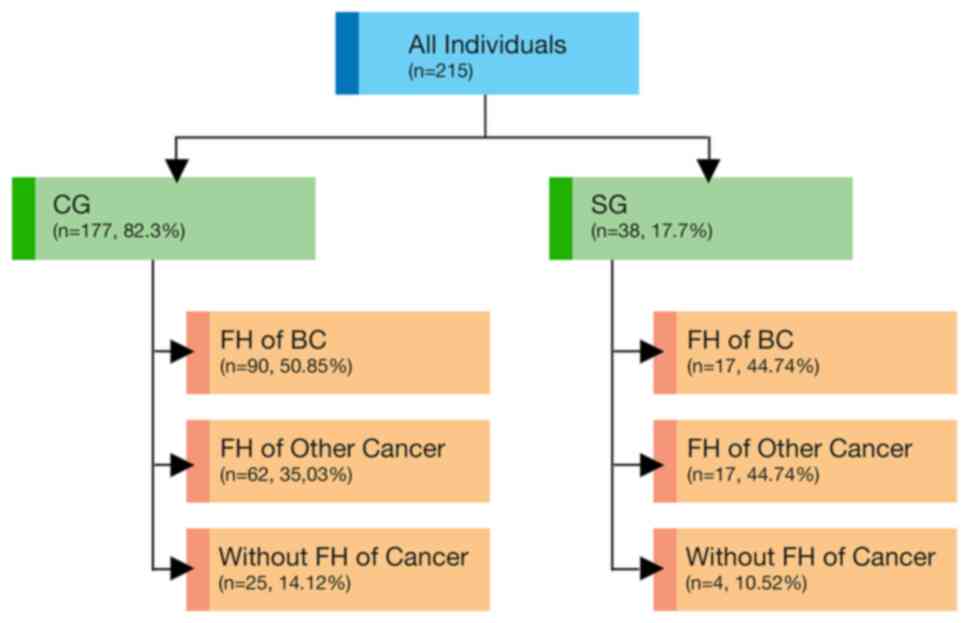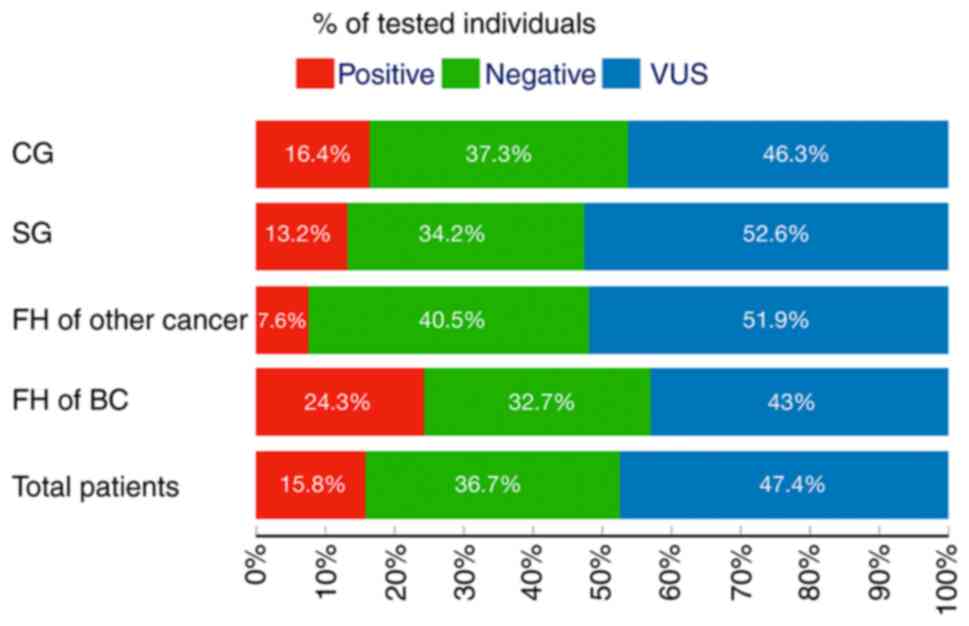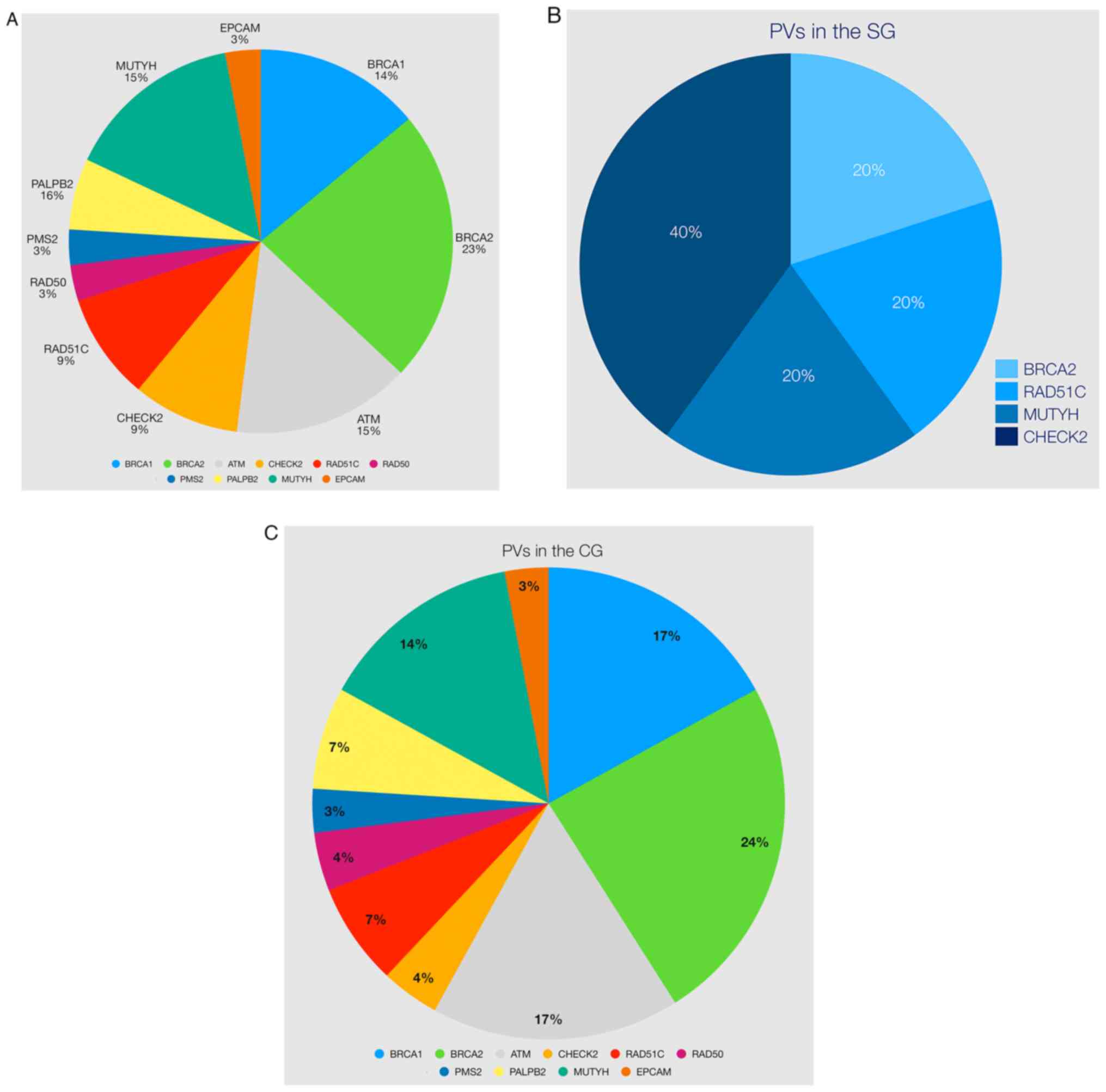|
1
|
Ferlay J, Colombet M, Soerjomataram I,
Parkin DM, Piñeros M, Znaor A and Bray F: Cancer statistics for the
year 2020: An overview. Int J Cancer. 149:778–789. 2021. View Article : Google Scholar
|
|
2
|
Ferlay J, Ervik M, Lam F, Colombet M, Mery
L, Piñeros M, Znaor A, Soerjomataram I and Bray F: (2018). Global
cancer observatory: Cancer today. Lyon, France: International
Agency for Research on Cancer. Available from. https://gco.iarc.fr/today28–May. 2019
|
|
3
|
Newman B, Austin MA, Lee M and King MC:
Inheritance of human breast cancer: evidence for autosomal dominant
transmission in high-risk families. Proc Natl Acad Sci USA.
85:3044–3048. 1988. View Article : Google Scholar : PubMed/NCBI
|
|
4
|
Claus EB, Risch N and Thompson WD: Genetic
analysis of breast cancer in the cancer and steroid hormone study.
Am J Hum Genet. 48:232–242. 1991.PubMed/NCBI
|
|
5
|
Walsh T and King MC: Ten genes for
inherited breast cancer. Cancer Cell. 11:103–105. 2007. View Article : Google Scholar : PubMed/NCBI
|
|
6
|
Domchek SM, Friebel TM, Singer CF, Evans
DG, Lynch HT, Isaacs C, Garber JE, Neuhausen SL, Matloff E, Eeles
R, et al: Association of risk-reducing surgery in BRCA1 or BRCA2
mutation carriers with cancer risk and mortality. JAMA.
304:967–975. 2010. View Article : Google Scholar : PubMed/NCBI
|
|
7
|
The National Comprehensive Cancer Network,
. https://www.nccn.org30–October. 2020
|
|
8
|
Valencia OM, Samuel SE, Viscusi RK, Riall
TS, Neumayer LA and Aziz H: The role of genetic testing in patients
with breast cancer: A review. JAMA Surg. 152:589–94. 2017.
View Article : Google Scholar : PubMed/NCBI
|
|
9
|
Beitsch PD, Whitworth PW, Hughes K, Patel
R, Rosen B, Compagnoni G, Baron P, Simmons R, Smith LA, Grady I, et
al: Underdiagnosis of hereditary breast cancer: Are genetic testing
guidelines a tool or an obstacle? J Clin Oncol. 37:453–460. 2019.
View Article : Google Scholar : PubMed/NCBI
|
|
10
|
Asphaug L and Melberg HO: The
cost-effectiveness of multigene panel testing for hereditary breast
and ovarian cancer in Norway. MDM Policy Pract. Feb 1–2019.(Epub
ahead of print). doi: 10.1177/2381468318821103. View Article : Google Scholar : PubMed/NCBI
|
|
11
|
Stanislaw C, Xue Y and Wilcox WR: Genetic
evaluation and testing for hereditary forms of cancer in the era of
next-generation sequencing. Cancer Biol Med. 13:55–67. 2016.
View Article : Google Scholar : PubMed/NCBI
|
|
12
|
Romeo G and Bittles AH: Consanguinity in
the contemporary world. Hum Hered. 77:6–9. 2014. View Article : Google Scholar : PubMed/NCBI
|
|
13
|
Hamamy H: Consanguineous marriages:
Preconception consultation in primary health care settings. J
Community Genet. 3:185–192. 2012. View Article : Google Scholar : PubMed/NCBI
|
|
14
|
Alper OM, Erengin H, Manguoğlu AE, Bilgen
T, Cetin Z, Dedeoğlu N and Lüleci G: Consanguineous marriages in
the province of Antalya, Turkey. Annales de Genetique. 47:129–138.
2004. View Article : Google Scholar : PubMed/NCBI
|
|
15
|
Erdem Y and Tekşen F: Genetic screening
services provided in Turkey. J Genet Couns. 22:858–864. 2013.
View Article : Google Scholar : PubMed/NCBI
|
|
16
|
Tsaousis GN, Papadopoulou E, Apessos A,
Agiannitopoulos K, Pepe G, Kampouri S, Diamantopoulos N, Floros T,
Iosifidou R, Katopodi O, et al: Analysis of hereditary cancer
syndromes by using a panel of genes: Novel and multiple pathogenic
mutations. BMC Cancer. 19:5352019. View Article : Google Scholar : PubMed/NCBI
|
|
17
|
Richards S, Aziz N, Bale S, Bick D, Das S,
Gastier-Foster J, Grody WW, Hegde M, Lyon E, Spector E, et al:
Standards and guidelines for the interpretation of sequence
variants: A joint consensus recommendation of the american college
of medical genetics and genomics and the association for molecular
pathology. Genet Med. 17:405–424. 2015. View Article : Google Scholar : PubMed/NCBI
|
|
18
|
Povysil G, Tzika A, Vogt J, Haunschmid V,
Messiaen L, Zschocke J, Klambauer G, Hochreiter S and Wimmer K:
panelcn.MOPS: Copy-number detection in targeted NGS panel data for
clinical diagnostics. Hum Mutat. 38:889–897. 2017. View Article : Google Scholar : PubMed/NCBI
|
|
19
|
Akcay IM, Celik E, Agaoglu NB, Alkurt G,
Kizilboga Akgun T, Yildiz J, Enc F, Kir G, Canbek S, Kilic A, et
al: Germline pathogenic variant spectrum in 25 cancer
susceptibility genes in Turkish breast and colorectal cancer
patients and elderly controls. Int J Cancer. 148:285–295. 2020.
View Article : Google Scholar : PubMed/NCBI
|
|
20
|
Lang GT, Shi JX, Hu X, Zhang CH, Shan L,
Song CG, Zhuang ZG, Cao AY, Ling H, Yu KD, et al: The spectrum of
BRCA mutations and characteristics of BRCA-associated breast
cancers in China: Screening of 2,991 patients and 1,043 controls by
next-generation sequencing. Int J Cancer. 141:129–142. 2017.
View Article : Google Scholar : PubMed/NCBI
|
|
21
|
Walsh T, Casadei S, Coats KH, Swisher E,
Stray SM, Higgins J, Roach KC, Mandell J, Lee MK, Ciernikova S, et
al: Spectrum of mutations in BRCA1, BRCA2, CHEK2, and TP53 in
families at high risk of breast cancer. JAMA. 295:1379–1388. 2006.
View Article : Google Scholar : PubMed/NCBI
|
|
22
|
Han SA, Kim SW, Kang E, Park SK, Ahn SH,
Lee MH, Nam SJ, Han W, Bae YT, Kim HA, et al: The prevalence of
BRCA mutations among familial breast cancer patients in Korea:
Results of the Korean hereditary breast cancer study. Fam Cancer.
12:75–81. 2013. View Article : Google Scholar : PubMed/NCBI
|
|
23
|
The National Comprehensive Cancer Network.
Genetic/Familiar High-Risk Assessment, Breast and Ovarian (Version
3.2019), . https://www.nccn.org/professionals/physician_gls/pdf/genetics_screening.pdf30–October2020.
|
|
24
|
Yazıcı H, Kılıç S, Akdeniz D, Şükrüoğlu Ö,
Tuncer ŞB, Avşar M, Kuru G, Çelik B, Küçücük S and Saip P:
Frequency of rearrangements versus small indels mutations in BRCA1
and BRCA2 Genes in Turkish patients with high risk breast and
ovarian cancer. Eur J Breast Health. 14:93–99. 2018.PubMed/NCBI
|
|
25
|
Aktas D, Gultekin M, Kabacam S,
Alikasifoglu M, Turan AT, Tulunay G, Kose MF, Ortac F, Yüce K,
Tunçbilek E and Ayhan A: Identification of point mutations and
large rearrangements in the BRCA1 gene in 667 Turkish unselected
ovarian cancer patients. Gynecol Oncol. 119:131–135. 2010.
View Article : Google Scholar : PubMed/NCBI
|
|
26
|
Judkins T, Rosenthal E, Arnell C, Burbidge
LA, Geary W, Barrus T, Schoenberger J, Trost J, Wenstrup RJ and Roa
BB: Clinical significance of large rearrangements in BRCA1 and
BRCA2. Cancer. 118:5210–5216. 2012. View Article : Google Scholar : PubMed/NCBI
|
|
27
|
Arnold AG, Otegbeye E, Fleischut MH,
Glogowski EA, Siegel B, Boyar SR, Salo-Mullen E, Amoroso K, Sheehan
M, Berliner JL, et al: Assessment of individuals with BRCA1 and
BRCA2 large rearrangements in high-risk breast and ovarian cancer
families. Breast Cancer Res Treat. 145:625–634. 2014. View Article : Google Scholar : PubMed/NCBI
|
|
28
|
Casilli F, Tournier I, Sinilnikova OM,
Coulet F, Soubrier F, Houdayer C, Hardouin A, Berthet P, Sobol H,
Bourdon V, et al: The contribution of germline rearrangements to
the spectrum of BRCA2 mutations. J Med Genet. 43:e492006.
View Article : Google Scholar : PubMed/NCBI
|
|
29
|
Gonzalez-Hormazabal P, Gutierrez-Enriquez
S, Gaete D, Reyes JM, Peralta O, Waugh E, Gomez F, Margarit S,
Bravo T, Blanco R, et al: Spectrum of BRCA1/2 point mutations and
genomic rearrangements in high-risk breast/ovarian cancer Chilean
families. Breast Cancer Res Treat. 126:705–716. 2011. View Article : Google Scholar : PubMed/NCBI
|
|
30
|
Pylkäs K, Erkko H, Nikkilä J, Sólyom S and
Winqvist R: Analysis of large deletions in BRCA1, BRCA2 and PALB2
genes in Finnish breast and ovarian cancer families. BMC Cancer.
8:1462008. View Article : Google Scholar : PubMed/NCBI
|
|
31
|
Yurgelun MB, Allen B, Kaldate RR, Bowles
KR, Judkins T, Kaushik P, Roa BB, Wenstrup RJ, Hartman AR and
Syngal S: Identification of a variety of mutations in cancer
predisposition genes in patients with suspected lynch syndrome.
Gastroenterology. 149:604–613.e20. 2015. View Article : Google Scholar : PubMed/NCBI
|
|
32
|
Macklin S, Durand N, Atwal P and Hines S:
Observed frequency and challenges of variant reclassification in a
hereditary cancer clinic. Genet Med. 20:346–350. 2018. View Article : Google Scholar : PubMed/NCBI
|
|
33
|
Moghadasi S, Eccles DM, Devilee P,
Vreeswijk MP and van Asperen CJ: Classification and clinical
management of variants of uncertain significance in high penetrance
cancer predisposition genes. Hum Mutat. 37:331–336. 2016.
View Article : Google Scholar : PubMed/NCBI
|
|
34
|
Howlett NG, Taniguchi T, Olson S, Cox B,
Waisfisz Q, De Die-Smulders C, Persky N, Grompe M, Joenje H, Pals
G, et al: Biallelic inactivation of BRCA2 in Fanconi anemia.
Science. 297:606–609. 2002. View Article : Google Scholar : PubMed/NCBI
|
|
35
|
Levitus M, Waisfisz Q, Godthelp BC, de
Vries Y, Hussain S, Wiegant WW, Elghalbzouri-Maghrani E,
Steltenpool J, Rooimans MA, Pals G, et al: The DNA helicase BRIP1
is defective in Fanconi anemia complementation group J. Nat Genet.
37:934–935. 2005. View
Article : Google Scholar : PubMed/NCBI
|
|
36
|
Reid S, Schindler D, Hanenberg H, Barker
K, Hanks S, Kalb R, Neveling K, Kelly P, Seal S, Freund M, et al:
Biallelic mutations in PALB2 cause Fanconi anemia subtype FA-N and
predispose to childhood cancer. Nat Genet. 39:162–164. 2007.
View Article : Google Scholar : PubMed/NCBI
|
|
37
|
Belaiba F, Medimegh I, Bidet Y, Boussetta
S, Baroudi O, Mezlini A, Bignon YJ and Benammar El gaaied A:
BRCA1/BRCA2 Mutations Shaped by ancient consanguinity practice in
southern mediterranean populations. Asian Pac J Cancer Prev.
19:2963–2972. 2018.PubMed/NCBI
|
|
38
|
Medimegh I, Troudi W, Omrane I, Ayari H,
Uhrhummer N, Majoul H, Benayed F, Mezlini A, Bignon YJ, Sibille C
and Elgaaied AB: Consanguinity protecting effect against breast
cancer among tunisian women: Analysis of BRCA1 haplotypes. Asian
Pac J Cancer Prev. 16:4051–4055. 2015. View Article : Google Scholar : PubMed/NCBI
|
|
39
|
LaDuca H, Polley EC, Yussuf A, Hoang L,
Gutierrez S, Hart SN, Yadav S, Hu C, Na J, Goldgar DE, et al: A
clinical guide to hereditary cancer panel testing: Evaluation of
gene-specific cancer associations and sensitivity of genetic
testing criteria in a cohort of 165,000 high-risk patients. Genet
Med. 22:407–415. 2019. View Article : Google Scholar : PubMed/NCBI
|
|
40
|
Couch FJ, Nathanson KL and Offit K: Two
decades after BRCA: Setting paradigms in personalized cancer care
and prevention. Science. 343:1466–1470. 2014. View Article : Google Scholar : PubMed/NCBI
|
|
41
|
Bagwell AK, Sutton TL, Gardiner S and
Johnson N: Outcomes of large panel genetic evaluation of breast
cancer patients in a community-based cancer institute. Am J Surg.
221:1159–1163. 2021. View Article : Google Scholar : PubMed/NCBI
|

















